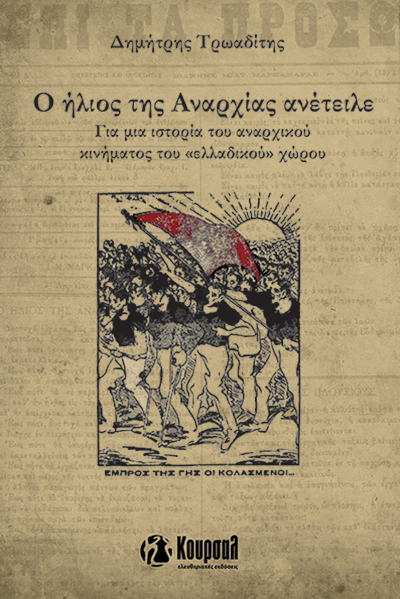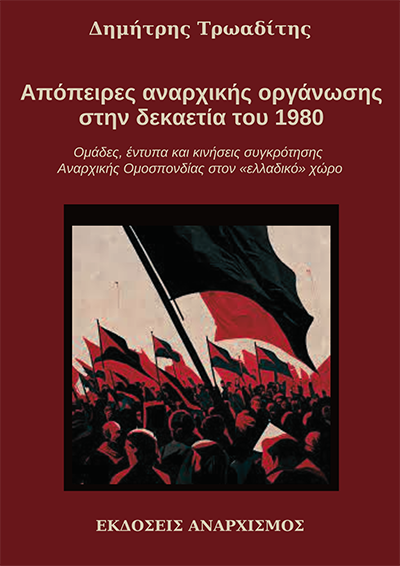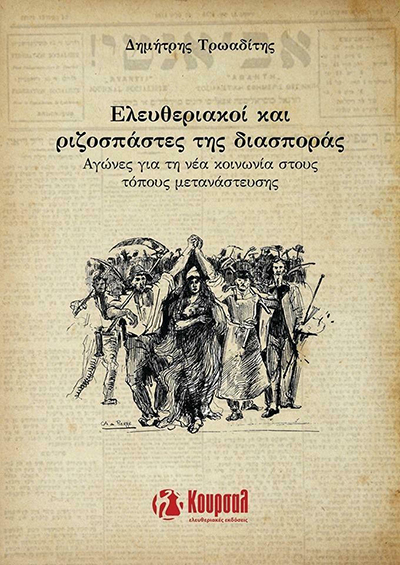The first trade union in Egypt under the name Brotherhood of Workers founded in 1872 by Greek workers, most of which came from the island of Corfu.
The first anarchist publication in Egypt appeared in Alexandria, probably in 1877 with the title «Il Lavoratore» («The Worker") in Italian language.
In September 1878, Errico Malatesta leaves Naples to avoid internment. He goes to Alexandria, Egypt where there is a thriving community of Italian workers. Meanwhile, after King Umberto I assumes the throne of Italy, the republican Passamante unsuccessfully attempts to assassinate the new king. There is widespread repression throughout Italy, in particular, against the anarchists. A meeting of Italian patriots organized in Egypt to decry the act of Passamante, and in response the Italian workers begin to organize a demonstration in front of the Italian Consulate to salute Passamante and oppose the Italian patriots. Before this can take place however, Malatesta is arrested along with Alvina and Parini. Malatesta and Alvina are both deported. Parini though a native of Leghorn, was a long time resident of Egypt and managed to stay there.
Another Italian anarchist, Amílcare Tsipriani is arrested and imprisoned in Italy in 1881 for the killing of an Italian in Alexandria in 1867. This incident was previously ruled self-defence but was invoked by the Italian authorities to put Cipriani out of commission when during his revolutionary campaigning in 1881. Cipriani's imprisonment becomes a celebrated case across the left. Cipriani remained for a quite long time in Greece.
On April 1, 1882, Egyptian charcoal workers began a strike (the first in the history of the country) against Suez Canal at Port Said company. The strike had strong anarchist participation, perhaps incitement.
During the same year the President of the Italian Workers Association in Alexandria sent a letter to the new government under Prime Minister Sami Pasha al-Barudi supporting the insurrection of Ahmad Orabi and denouncing foreign intervention.
In 1884 an anarchist review appeared under the title«La Questione Sociale» (“The Social Question"), in Italian language.
In 1890, the Patenta law is passed effectively ending the guild system in Egypt. The effect of this is a boost to labor activity in the country.
On 18 March 1894, the Egyptian Newspaper, Al-Hilal, reports the arrest of a Greek worker in Alexandria for distributing what the police call "anarchist leaflets". The leaflets call for workers to celebrate the anniversary of the Paris Commune and ends "Long Live Anarchy." (or "Long live Communism" according to another translation.) On October 1 1894 Greek workers employed by the Suez Canal Company go on strike. Sakellaridis Yannakakis establishes a shoemakers union. Greek physician Dr. A. Skouphopoulos is another well known agitator in this region. Under his leadership the International Labor Union of the Isthmus of Suez founded in 1918 after also an initiative of Mutual Brotherhood "The Phoenix", which was founded in 1908. Also in 1923 in Alexandria Skouphopoulos’ work "Old and New Ideas” released.
On October 1, 1894, Greek workers employed in Suez Canal went on strike with anarchist incitement. During the same year, International Association of Cigarette Makers founded in Cairo by mainly the initiative of Italian anarchists and a few Greeks. This time it broke a general cigarette makers and tobacco workers strike. Also, the same year the Greek anarchist Sakellaridis Yannakakis actively participated in the foundation of a union of shoe makers. (He later allegedly involved in the Socialist Centre of Istanbul, Turkey).
In 1899 there was another tobacco workers' strike, in which some Greek anarchists such as Aristides Pappas, N. Chrysoudis or Zografos and S. Vlachopoulos, Egyptian Mohamed Sintky and Jewish anarchist Solomon Goldenburg played a leading role. Shortly after, the manufacturers managed oust Pappas, Chrysoudis and Vlachopoulos from the scene and formed a bosses association with some Greek cigarette makers as members. But already among the workers a group of Greek anarchists and revolutionaries, such as the Vourtzonis brothers, Nick Giannis and Yiannis Mavros, was fairly active.
In early 1900, the worker K. Asteriadis, published in Cairo a pamphlet entitled "Capital-Work or Domination-Money”, adopting a kind of anarcho-syndicalist views. The same year Italian workers struck while working on Aswan Dam. Tobacco and cigarette workers called for a general strike.
In 1900, the libertarian Tucker Publications in New York, publishes a pamphlet on ancient Egypt by Paul Pfitzner called Five Thousand Years Ago.
Luigi Galleani, escapes imprisonment on the island of Pantelleria, off the coast of Sicily, in 1900, and flees to Egypt. He stays among Italian comrades for a year until threatened with extradition, whereupon he flees to London, at the age of 40. Galleani's journal Cronaca Sovversiva (founded June 6, 1903 in Vermont), is widely read by Italian anarchists in many countries including those in North Africa.
In 1903, the Union of Employees of International Trade Firms is formed.
Shortly before the then known anarchists Dimitris Karampilias and Panos Makhairas arrive in Egypt from Greece (1901-1902), another anarchist from Athens Nickos Doumas, former member of the Central Association of Kallergis’ Socialists and the Socialist League “World” in Athens, had settled in Cairo. In particular, under the latter's initiative, in 1907 an anarcho-syndicalist newspaper appeared with the title "Worker", circulated in Alexandria and Cairo. In this newspaper also participated doctor G. Saraphides, Zacharias Hatzopoulos (1880-1935, brother of familiar Greek socialist Costas and anarchist Dimitris Hatzopoulos, who in 1913 published in Alexandria a booklet entitled "Joy and Hedonism in the Revolution"), George Telemitis, Stavros Kouchtsoglous (who worked as a cigarette factory at Tsanakli), Iosif Chionis and K. Asteriadis.
Dimitris Karampilias born in the village of Mintilogli Achaias (outside of Patras) in 1872. After the dissolution of anarchist movement in Patras, he settled in Athens with Yiannis Magkanaras and both participated in the anarchist activities there. In 1901, he migrated in Alexandria, Egypt, where worked as a cigarette-maker and participated in the local working class and anarchist movement, collaborating with other Greek anarchists who had been living there, but also with Italians. After 2 or 3 years maybe he left Egypt for France, where he worked as a tailor and participated in the French anarchosyndicalist circles."
Simultaneously, N. Doumas was one of the main founders of the Socialist Center of Cairo. In 1908, the "Worker" stopped its circulation, but the same year G. Saraphides published another newspaper called "The News" (which was socialist literary-content), with which most of the participants in "Worker" group collaborated.
Greek anarchists, Iosif Chionis and Gerasimos Louzis, along with Italian anarcho-syndicalists Vozai, Loggi and Pitzoriti, contributed to the establishment of the International Association of Printers, which had a Greek section - with Iosif Chionis as secretary - and an Italian section.
During 1907-1908 and until 1913, Italian and Greek anarcho-syndicalist had influenced almost all the printers in Egypt. They also published «Bulletino Typografico» (in Italian) and their protests and initiatives led printers to the conquest of eight hours day, whereas before they worked 12-14 hours. «Bulletino Typografico» played an important role in the development of the trade union movement in Egypt.
In 1907, foreign workers in Alexandria and Cairo, among them Greeks, organised demonstrations and other actions against the planned deportation of some Russian refugees who had fled to Egypt to escape the wave of repression after the failed Revolution of 1905 in Russia.
In 1908, The Cairo Tramworkers Union is formed.
Between 1909-1911, two pages were written and printed in Greek, by Chionis, Louzis and Loukas Christophides. At the same time, articles in Greek, written by Stavros Kouchtsoglous, George Vrisimitzakis and someone else with the pseudonym Spartacus, published in the Italian anarchist newspaper «Idea» circulated in Cairo. In this newspaper published also articles of the Spanish anarchist and editor of the anarchist newspaper «Tierra y Libertad» («Land and Freedom") Jose Estivalis (an article of which published in the socialist newspaper “Koinonismos" in Athens during the same period). Jose Estivalis later became predominantly known as an anarchist filmmaker with the name Armand Guerra.
In 1909, Greek anarchist George Telemitis (for whom nothing else available until today, and perhaps the name is a pseudonym), wrote and released a pamphlet with the title “Kato ta Eidola“ (“Down with the Idols”) on the occasion of the execution of the Spanish anarchist teacher Francisco Ferrer y Guardia, the same year in Spain. This pamphlet was circulated widely in Greece by anarchists and socialists.
In 1911, Egyptian State launched a series of prosecutions against the anarchists and the Italian anarcho-syndicalists, Vozai, Loggi and Pitzoriti and some other Italians were deported. But the Greeks as Stavros Kouchtsoglous and Nickos Doumas intensively continued their actions. Kouchtsoglous published in 1912 in Cairo a pamphlet with the title “Kato I Maska” (“Down with the Mask”) and Doumas worked with other Italian militants such as Antonio and Tzampio. However a new wave of persecution came, by which Italians hunted mercilessly and N. Doumas was forced to leave Egypt. He settled in Athens in late 1912 and in 1913 was one of the pioneers of the founding of the Footwear Workers' Association, after finding work as a shoemaker and actively participated in the working class movement, although some historians wrote that he progressively became a marxist.
Historian and academic Panagiotis Noutsos writes that from 1915 onwards Nickos Doumas turned to reformist socialism, associated with social-democrat Plato Drakoulis and became also a member of the then Greek Socialist Party (SEKE). Marxist historian Yiannis Kordatos also wrote that both sons of Nickos Doumas, George and Antonis, joined as well reformist socialists confirming Noutsos’ allegations. However, George Doumas participated in the left wing which left or expelled from SEKE and became Communist Union.
Also, during his anarchosyndicalist period in Egypt, Nickos Doumas wrote and published some books and pamphlets and corresponded with various socialist newspapers in Greece, amongst them the newspaper “O Ergatis” ("The Worker") from the city of Volos (in Thessaly, central Greece). Basically, he was a correspondent of this newspaper in Egypt, in which signed under the pseudonym "Worker").
Other Greek anarchists in Egypt were also authors of books and/or pamphlets, such as G. Saraphidis or someone named G. Drakopoulos who wrote and published “H Ataxiki Epanastasis” ("The Classless Revolution”), although it is unknown if it was a really anarchist or a generally radical work.
At the same time another Greek newspaper of Egypt, “Sosialistiki” (“Socialist"), published translations of works of Mikhail Bakunin and other anarchists thinkers.
Generally, apart of union and strike activism and anarchist propaganda, several Greek anarchists and libertarians in Egypt dealt with both theoretical translations of anarchism, such as M. Bakunin, and different types of literature. In 1904 the magazine “Nea Zoi” ("New Life") started, in 1911 came another entitled “Grammata” ("Letters") and in 1916 "Phoenix" and "Propylaea, while most anarchist and libertarian intellectuals participated also in the scattered groups of demoticists which were active during this time in Egypt.
In April 1919, marxist George Skliros (Constantinides) - author of “To Koinoniko Mas Zitima” ("Our Social Question") – which said laid the foundations of the so-called scientific socialism in Greece - one of the pioneers of the movement of demoticism – at a writers event in Cairo, announced it had already started writing a study on the work of P. Kropotkin, which, as far as we know, he never completed. Between June and December 1917, G. Constantinides gave lectures on Leo Tolstoy, in Peoples’ Library in Alexandria organised by the magazine “Grammata”. We must mention here that “Grammata” stopped publication and re-published in July 1920, under the directorship of Stephanos Pargas and M. Peridis as editor, but it is not considered as a continuation of the publication of the first period. Among the collaborators of “Grammata” was also the Italian anarchist Luigi Fabbri, whose extensive article "The movement of ideas in Italy” published in translation in volume 2 (September-October 1920) on page 96.
In September 1919, following a summer of strikes, the Italian workers, Max di Collalto (publisher of Roma and member of the Societe Internationale des Employes du Caire) and Guiseppe Pizzuto, a revolutionary socialist of the printers union, are both deported.
Around 1920, Salama Musa, Muhammad 'Abdullah al-'Inani and Husni al-Urabi form the Socialist Party, in opposition to the Wafd nationalist Party. In 1924, Husni al-Urabi, Antun Marun and Joseph Rosenthal (a Jewish Italian who settled Egypt in 1899) form the Egyptian Communist Party in 1924.
In 1924, The Wafd Party forms the General Federation of Workers Unions in the Nile Valley to prevent the Communists from doing so.
Lastly, we must say a few things about George Vrisimitzakis. George Vrisimitzakis was Cretan origin but was born in Alexandria in 1890. Since his young age he was a little untamed and sinewy. He studied French Literature and Science in Paris. He didn’t specialised in something specific subject and never sought to acquire academic qualifications. He knew fluent French, Italian and Arabic, and was self-taught in Greek. From summer 1912 until spring of 1913 he stayed at Viareggio, Italy, where associated with a local anarchist circle. In summer of 1915, lived in Paris. In 1918-1919 he was in Athens and worked with the magazine "Altar". In 1921 he returned to Alexandria, but in 1926 moved back to France where he stayed until the end of his life on December 19, 1947. George Vrisimitzakis, devoted himself to literary studies, wrote a critique in the work of poet Constantine Cavafy, translated various works including classics of anarchism and he was one of the publishers of the magazine “Grammata” (in the first period). He also wrote dozens of books, booklets and articles on various social issues most of which published in “Grammata” and republished in other magazines and newspapers. Until 1931, many magazines and newspapers in Greece and Egypt used his translations, introductions and notes . During the last years of his life published articles in French literary journals, many of whom signed with the pseudonym Philetas.
Sources:
http://ngnm.vrahokipos.net
http://www.anarkismo.net
http://www.oocities.org/ringfingers/nonwesternweb.html
http://libcom.org/forums/history/greek-turkish-population-exchange31072007




